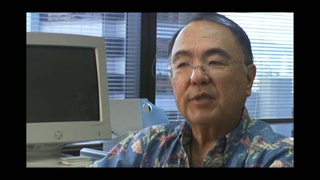Interviews
Neighbors' sympathy after Pearl Harbor
Well we had a retail florist right near University of Southern California, and my father when he first came here, he said “as long as you are in the United States of America, you deal with American people.” So we purposely stayed out of J-town. And most of our clientele was Americans. And so when we opened up, we were wondering whether if we should open up a business on a Monday, the following Pearl Harbor. But we did. And it, we had expressions of sympathy from our Lutheran Church people, and the Methodist Church people, and my Hakujin customers were very very sympathetic and they said anything that they can do to help us, they were willing to help us. So we didn’t have any problems there at that time.
Date: November 15, 2000
Location: New York, United States
Interviewer: John Esaki
Contributed by: Watase Media Arts Center, Japanese American National Museum
Explore More Videos

His testimony has more credibility because of his race
(1922 - 2005) Former U.S. Army counterintelligence officer

Different tension between East Coast and Los Angeles
Japanese American Creative designer living in Japan

Being an American soldier and an "enemy alien"
(1923-2011) Lawyer, MIS veteran, founder of Francis and Sarah Sogi Foundation

Not relating to Japan Americans' experiences on the mainland
(1923-2011) Lawyer, MIS veteran, founder of Francis and Sarah Sogi Foundation


Less information about Hawai‘i in mainland
(b.1944) Founder of Kobayashi Group, LLC

A teenager's memories of how a local newspaper misrepresented Japanese Americans
(b. 1925) Draft resister

Reaction of Japanese American community toward draft resistance stance
(b. 1925) Draft resister

The role of the media in influencing people's opinions
(b. 1925) Draft resister

Living conditions in prison while serving time for resisting the draft
(b. 1925) Draft resister

Talking to children about decision to resist the draft during World War II
(b. 1925) Draft resister

Deciding whether to answer "yes-yes" on the loyalty questionnaire in order to leave camp
(b. 1925) Draft resister

Reflecting on Japanese Americans' response to incarceration
(b. 1925) Draft resister


First learning about the incarceration experience in college
(b. 1955) Lawyer
